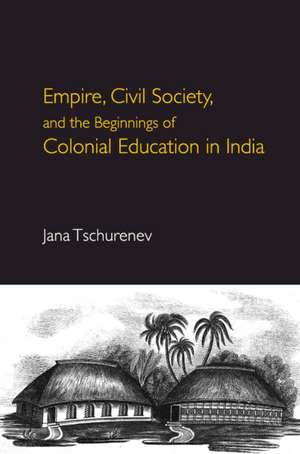Empire, Civil Society, and the Beginnings of Colonial Education in India
Adaptat de Jana Tschureneven Limba Engleză Hardback – 22 mai 2019
Preț: 702.07 lei
Preț vechi: 911.78 lei
-23% Nou
Puncte Express: 1053
Preț estimativ în valută:
134.38€ • 146.02$ • 112.96£
134.38€ • 146.02$ • 112.96£
Carte tipărită la comandă
Livrare economică 17-23 aprilie
Preluare comenzi: 021 569.72.76
Specificații
ISBN-13: 9781108498333
ISBN-10: 1108498337
Pagini: 386
Dimensiuni: 157 x 235 x 29 mm
Greutate: 0.59 kg
Editura: Cambridge University Press
Colecția Cambridge University Press
Locul publicării:Cambridge, United Kingdom
ISBN-10: 1108498337
Pagini: 386
Dimensiuni: 157 x 235 x 29 mm
Greutate: 0.59 kg
Editura: Cambridge University Press
Colecția Cambridge University Press
Locul publicării:Cambridge, United Kingdom
Cuprins
List of figures; List of tables; List of abbreviations; Acknowledgements; Introduction: empire civil society, and educational transformation in India; 1. A colonial experiment in education, Madras, 1789–1796; 2. Education of the poor, 1805–1813; 3. Missionaries, empire, and the cause of universal education, 1792–1824; 4. Race, class, and gender: the social agenda of education, 1809–1830; 5. Rules and numbers: transforming rural education, 1814–1830; 6. Intellectual conquest: education societies, 'useful knowledge', and the Bengal Renaissance, 1817–1854; 7. Civil society, government, and educational institutional-building, Bombay presidency, 1819–1882; 8. Teaching the marginalized: universal education and the politics of inequality, 1789–1937; Conclusion: the emergence of public elementary schooling in an imperial frame; Bibliography; Index.
Descriere
Offers a new perspective on the making of colonial education and the history of modern schooling in India.
